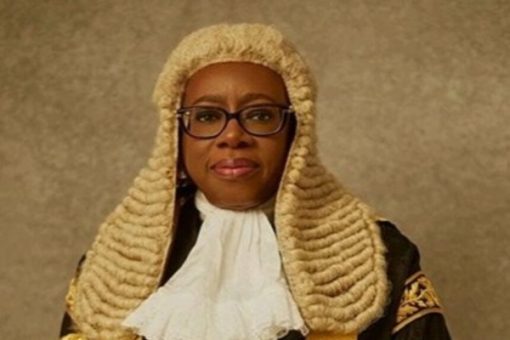In a historic session, the Senate on Wednesday confirmed Honourable Justice Kudirat Kekere-Ekun as the Chief Justice of Nigeria (CJN), marking a significant milestone in the country’s judicial system. Her confirmation followed a thorough screening by the Senate’s Committee of the Whole, with a unanimous approval by the lawmakers.
Justice Kekere-Ekun, who arrived at the Senate Chambers at 12:30 p.m. alongside other justices from the Supreme Court and Court of Appeal, was ushered into the chamber after Senator Opeyemi Bamidele (APC, Ekiti Central) invoked Order 12 of the Senate Standing Rules, allowing the presence of guests during her screening. The motion was seconded by Senator Oyewumi Olalere (PDP, Osun West), clearing the way for the formal proceedings to begin at 12:47 p.m.
Her screening, which lasted nearly two hours, concluded at 2:41 p.m. as Senators engaged with the Acting CJN on various issues concerning the Nigerian judiciary. During her address, Justice Kekere-Ekun reiterated her commitment to fighting corruption within the judiciary, emphasizing her track record of integrity and strictness. “I have always been known for zero tolerance towards corruption,” she said, vowing to uphold the highest ethical standards in her new role.
The confirmation also marked a historic moment for Nigerian women in law, as Justice Kekere-Ekun becomes the second female Chief Justice of Nigeria, following in the footsteps of Justice Aloma Mariam Mukhtar, who held the position from 2012 to 2014. Her nomination was put forward by the National Judicial Council (NJC) on August 15, 2024, following the retirement of former CJN, Justice Olukayode Ariwoola.
In her remarks to the Senate, Justice Kekere-Ekun outlined her priorities, which include improving the speed at which petitions are handled by the courts and ensuring that the judiciary remains insulated from external influence. “We must build a judiciary that is free from undue interference and one that the public can trust,” she said. She also pledged to advocate for improved infrastructure and welfare within the judiciary, stating that better working conditions are essential for the efficient functioning of the courts.
Justice Kekere-Ekun further addressed the challenges posed by electoral petitions, stressing the importance of strengthening national institutions and public behavior to discourage the over-reliance on courts for election matters. “The role of the judiciary should not be to resolve every election dispute,” she noted, advocating for electoral reforms that would minimize the need for post-election litigation.
The confirmation of Justice Kekere-Ekun comes after President Bola Tinubu sent a formal request to the Senate, urging them to expedite the process. In his letter, President Tinubu highlighted her distinguished career and leadership within the judiciary, expressing confidence that her tenure would bring positive reforms to the Nigerian judicial system.
“Pursuant to Section 231(1) of the Constitution of the Federal Republic of Nigeria (1999, as amended), which grants the president the power to appoint the Chief Justice of Nigeria on the recommendation of the National Judicial Council (NJC), and subject to confirmation by the Nigerian Senate, I hereby forward the nomination of Honourable Justice Kudirat Kekere-Ekun, CON, for your confirmation,” President Tinubu’s letter read.
Following her confirmation, Justice Kekere-Ekun has already assumed her duties. She was officially sworn in as the 23rd Chief Justice of Nigeria by President Tinubu on August 23, 2024, during a brief ceremony at the State House, Abuja. She took her oath of office at 11:38 a.m., before taking her seat at the Council Chambers alongside the President.
Born on May 7, 1958, in London, United Kingdom, Justice Kekere-Ekun’s distinguished legal career began at the University of Lagos, where she earned her law degree in 1980. She was called to the Nigerian Bar in 1981 after completing her training at the Nigeria Law School. Over the years, she has served in various capacities, including as a judge of the High Court of Lagos State, a Justice of the Court of Appeal, and later, as a Justice of the Supreme Court.
Her appointment as the Chief Justice of Nigeria represents a new chapter for the judiciary, with widespread expectations for reforms, integrity, and judicial independence under her leadership.



